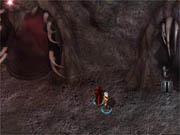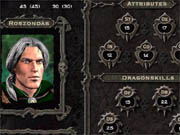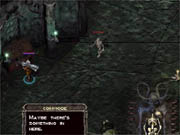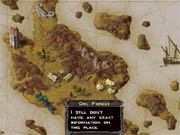Although it sounds more like a medieval topical cream than a role-playing game, Gorasul: Legacy of the Dragon is actually a successor to games the likes of Black Isle Studios' Baldur's Gate and Planescape: Torment. The first North American release from German designer Silver Style could even be characterized as an homage (the less charitable will want to substitute "rip-off" here) to these and other games using BioWare's Infinity engine. Both the story and gameplay of Gorasul should be familiar to anyone who battled the Bhaalspawn or sought the identity of the Nameless One. What won't be so familiar to veterans of those games are numerous production problems. Bugs and countless rough edges take a lot of the fun out of what seems to be a winning alternative to waiting for Neverwinter Nights to ship. There is still a lot to admire about Gorasul, though that affection is often sorely tested over the course of completing the lengthy campaign.

Truthfully, "often" doesn't even begin to describe the state of affairs here. You'll be constantly amazed at the lack of refinement. The most obvious and consistent errors concern the text. Because Gorasul was originally released earlier this fall in a German-language edition, North American gamers are playing a version that's been translated into English. On second thought, make that "butchered into psychedelic Esperanto." Nearly every sentence of onscreen dialogue in the game features mistakes of varying degrees, including minor offenses like confusing "their" for "there" and major ones that make conversations and instructions incomprehensible. You'll laugh out loud to lines like "It can be a live or death decision!" and "Attack! The enemies are slamming from the rear!" You'll scratch your head over lines like "Or do you think I am just put on off to the side?" and "Up! On to other things. Ade!" Most of all, you'll be bewildered at how the North American publisher, JoWood Productions, could have released this game in its current state. We might just have a successor to "Somebody set us up the bomb."
Poor language skills are not the only technical gaffes on display. Even though the German version of Gorasul has been on European shelves for three months, the programmers have done nothing to clean up the extensive number of bugs. Unexplainable installation issues forced us to reinstall the game twice, sound clipping and static are common, German audio occasionally pops up to narrate English text, and characters will sometimes be unresponsive to movement commands after you load a save. More ominously, crashes are frequent--and they often occur while you're trying to save your progress. Certain parts of your quest are more apt to drop you to the desktop than others. The opening and later stages of the game were bug-free, but the middle section featured a nightmarish stretch where crashes were constantly taking place.

All of the above is a real shame since Gorasul seems to be a great game under all the tarnish. Silver Style obviously took Baldur's Gate as a template and ran with the idea of making an inspired imitation. Everything you remember from the Infinity engine games is present here, aside from the multiplayer option. The character classes, isometric perspective, combat system, interface, and magical weapons and items have been adapted, most with only minor changes. Classes, for example, feature the traditional warriors and priests, but magic users are called magicians, and rangers are known as scouts. The other two choices are original, though the banisher seems to be sort of a specialized priest, and the judge of the swords is something like a paladin. Characters are rated in the five usual categories of strength, dexterity, constitution, intelligence, and charisma. Each can be altered during the creation process and after level advancement by drawing from a pool of points that can be distributed however you see fit. There are also attack and defense ratings, which can be bumped up with points as well during the progress of the game. Magic is drawn from mana, so forget about that cumbersome "sleep on it" restriction from Dungeons & Dragons.
From there, the design team went off on a tangent. Instead of relying on the traditional swords and sorcery fare to write the story, Silver Style hit on the adventure elements presented in Planescape: Torment. You portray Roszondas, who's just awakened from a decade of death with no memory of his past other than hazy recollections about fighting demons and the undead. However, in short order, you recall a lot about who you are, including your mission to defeat the evil forces invading the land of Gorasul and the special powers granted by your dragon stepfather, Crakan. These powers serve as an addition to the basic character stats. You're rated in dragon breath, dragon fear, dragon strength, and dragon eyes, and each can be adjusted with points awarded every time you advance a level. These attributes are of questionable value during the game, as they typically come into use only when Roszondas is in immediate peril. Whenever death approaches, he'll automatically use flame breath, a fear effect, or immense strength to fend off enemies. Dragon eyes is a noncombat specialty that progressively removes more of the fog of war from the map as you develop it as a skill.
Roszondas will eventually meet up with nonplayer characters that can be signed up to gather a party of four. But he's given one companion right from the start--a magical, intelligent weapon. After finishing with your creation of the leading man, you choose from seven standard weapon types like longsword, dagger, battle-ax, and so on. Each comes with its own set of configurable stats, including accuracy, break-proof, intelligence, and courage. Ego is also tracked, though it rises naturally and can't be adjusted. In the later stages of the campaign, your weapon's ego will reach such lofty heights that it will begin to question your actions. It further collects experience points and can rise in levels just like normal characters. Each weapon type is also given an archenemy racial type that it always wants to fight and another that it is afraid of. This adds a fair bit of distinctiveness to play at certain moments, though a lot of the weapon's personality is deflected by the absence of spoken lines.

Gameplay is similar to that in the original Baldur's Gate. You'll go from town to town, clearing out wilderness maps, talking with people, and stumbling across quests that need to be performed for experience points and valuable items. Some of these missions are simple errands, though others are more involved. A sense of humor colors the lighter events. The magic word to activate a teleportation device is "Please," and asking one peasant to reveal a secret causes him to reply, "It wouldn't be a secret if I told you, now would it?" It's not hilarious, but it's suitable comic relief.
Some of the innovations in play are noteworthy. Along with three basic difficulty settings, you can select from a trio of options that regulate the number and difficulty of puzzles and fights. Those who prefer an adventure-style RPG can go with more quests, while those who prefer hack-and-slash can choose more fighting. Anyone who can't decide can keep the default choice with a bit of both. Silver Style made a point of drawing players out of repetitive action as often as possible. Puzzles can be fairly difficult--made even more so by disjointed instructions that must have made a lot more sense in the original German--and are something that you'll have to deal with on all three settings to one degree or another. At specific points in the game you'll be presented with simple arcade-style challenges, such as hitting a bull's-eye with a bow and arrow. Dedicated role-players unaccustomed to these things should note that these moments aren't very tough and have little impact on the storyline. Another highlight is directing the defense of a kobold village on a separate tactics screen where you position the ugly little guys and they follow your orders.
As you might expect from the cut-rate translation and bugs, there isn't much visual chrome to be found here. Graphics are close to those seen in the Infinity engine games, albeit closer to what you would imagine a beta of Baldur's Gate to look like (though the resolution is an improved 800x600). The color palette and art aren't sophisticated, giving everything a bright, cartoony appearance. Textures are similarly "loud" and lacking in complexity. Animations are extremely awkward, with combat consisting of little more than an arm going up and coming straight back down. Spell effects consist of 2D sprites that are blocky and a good four or five years out of date. All that said, the visuals are crisp and should be acceptable to the average RPG fan. Nothing really gets in the way.

The same could describe the audio. That isn't a good thing, though, since there isn't much sound to begin with. The German voice acting has been removed without the addition of replacement English lines, so the dialogue sequences pass in silence. So does much of the combat. Battle effects are nearly nonexistent, and monsters make squeaks more appropriate to pigeons and rusty hinges. The musical score is average at best, with bombastic orchestral pieces that can grow tiresome over the course of your quests. Oddly, the best music in the game can only be heard on the map screen. This piece sounds a lot like a cross between a belly-dancing tune and the predinner entertainment at Medieval Times, and it adds a lot of character to the proceedings.
Not that Gorasul: Legacy of the Dragon really needs any more character. Silver Style has achieved something significant in copying the Baldur's Gate formula so well, even bettering it in some ways. The only problem is that these qualities are often impossible to appreciate because of all the bugs and translation errors. Enjoying a telling moment in the plot or a clever puzzle is tough, considering that you're forever confused by the screwball text or nervously anticipating that the program will crash to the desktop at any moment. With a little more time and money, this could have been an excellent role-playing game. As it is, Gorasul is only for those who aren't easily frustrated or who have the patience to wait for a patch.